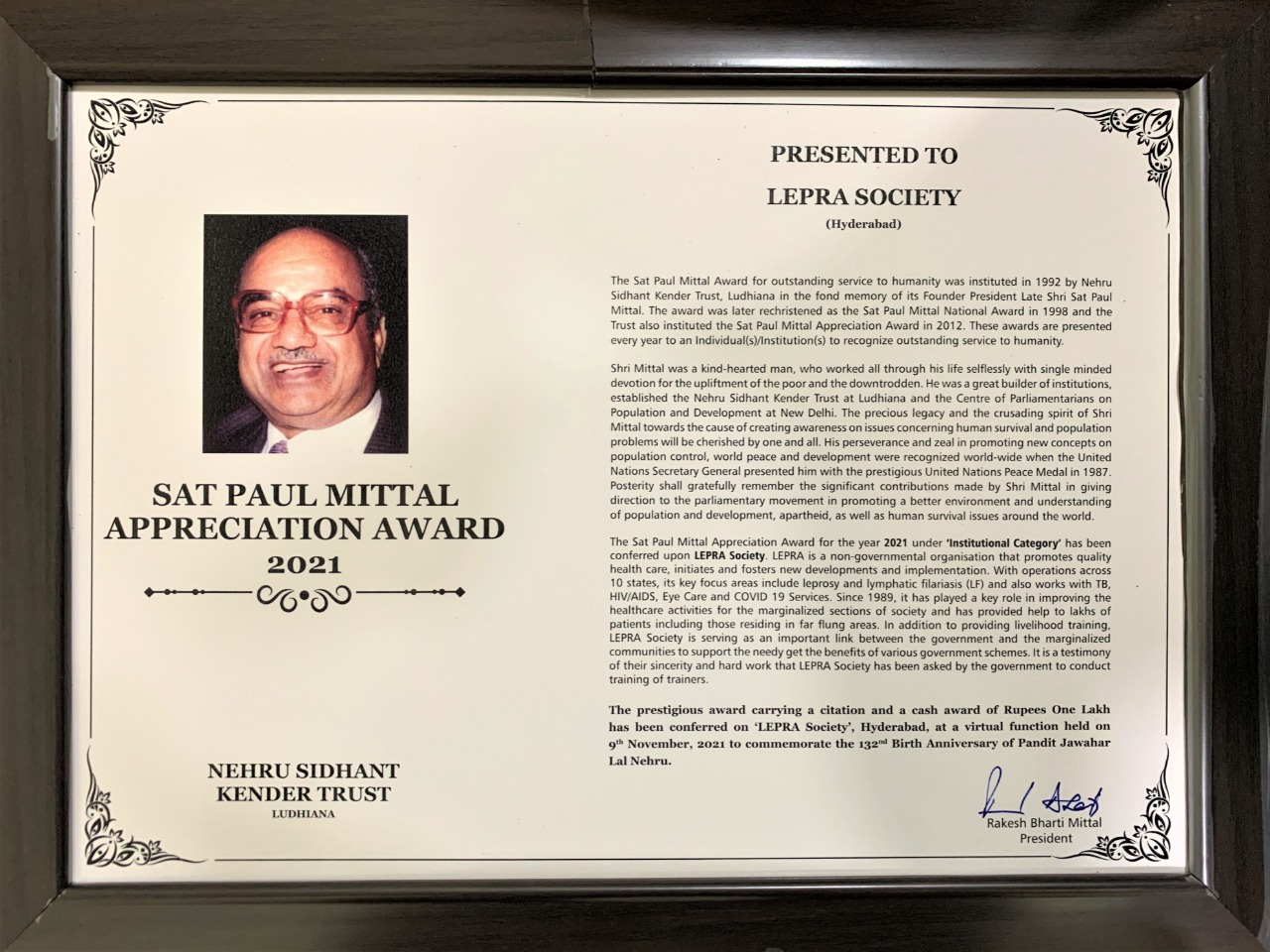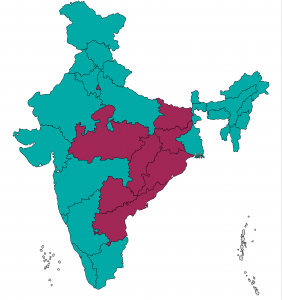
Andhra Pradesh, Bihar, Delhi, Jharkhand, Madhya Pradesh, Odisha, and Telangana
Our work at LEPRA is driven by our focus on leprosy, with the sole purpose of enabling children, women, and men affected by leprosy and other neglected diseases to transform their lives and overcome poverty and prejudice.
Leprosy is a neglected and communicable disease that is curable. However, if undetected or ignored, affected persons face a high risk of disabilities, medical complications, and ulcers. Also, the affected face stigma, social exclusion, mental health issues, and high economic costs – both direct (related to treatment and rehabilitation) and indirect (loss of income).
In 1989, one of the first operations undertaken by LEPRA was extending support to the National Leprosy Eradication Programme (NLEP) through the management of Multidrug Therapy (MDT) administration, in a total of five districts from Andhra Pradesh (AP), Karnataka and Odisha states. Gradually, we expanded operations to leprosy control with eleven projects, covering thirteen high endemic districts in the states of AP and Odisha.
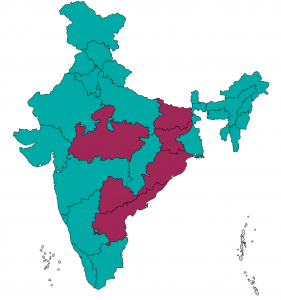
Andhra Pradesh, Bihar, Jharkhand, Madhya Pradesh, Odisha, and Telangana
LEPRA, with its experience in deformity management in leprosy, initiated similar interventions to address the disability care need among persons affected by lymphatic filariasis, (LF). The organisation initiated its interventions in lymphatic filariasis in 2006 covering Puri and Ganjam districts of Odisha. Currently, LEPRA is implementing eight LF projects covering 17 endemic districts of Bihar, Jharkhand, Odisha, Andhra Pradesh, Telangana and Madhya Pradesh states. The core activities of our LF project includes mapping and listing, morbidity management and prevention of disabilities (home and community based), self-support groups, foot care, treatment of complications, capacity building, support MDA implementation, socio-economic rehabilitation, social audits, networking for system strengthening and referral of hydrocele people for surgery and system strengthening.
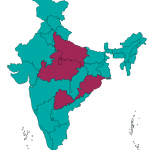 Madhya Pradesh, Odisha, Telangana, and Uttar Pradesh
Madhya Pradesh, Odisha, Telangana, and Uttar Pradesh
LEPRA has been working in Tuberculosis since 1996 in all key areas of TB control, including community mobilisation, direct delivery of services, private sector engagement, capacity building, communication and advocacy, and research linked to laboratory-related work in TB. It is a member organisation in partnership for TB care and control in India, Stop TB partnership, and the Initiative for Promoting Affordable and Quality TB Tests (IPAQT), NGO Health Consortium India, it has close network and linkages with state RNTCP of Telangana, Madhya Pradesh, Bihar, Sikkim, Odisha, and Andhra Pradesh. Represented as a member of Country Coordination Mechanisms (CCM) in TB (2013-15) and malaria (2009-12) constituencies. LEPRA, Blue Peter Public Health Research Centre (BPHRC), is the first private lab in the country to get accreditation from the Central TB Division for culture and drug susceptibility testing for M.Tb. Supporting the RNTCP in culture and drug susceptibility testing, LPA for diagnosis and follow-up of MDR TB cases under RNTCP covering 31 districts of Telangana.
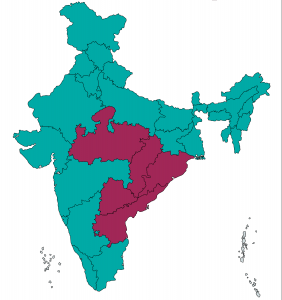
Andhra Pradesh, Chattisgadh, Madhya Pradesh, Odisha and Telangana
LEPRA gained experience of over 20 years in HIV and AIDS in care, support, prevention and treatment and working with the key populations at higher risk. LEPRA works through capacity building, knowledge sharing, technical support and advocacy to support the delivery of effective, innovative, community-based HIV and other health programs. Currently, covering 69 districts of Madhya Pradesh, Odisha, Chhattisgarh, Andhra Pradesh and Telangana states of India.
LEPRA started its journey in HIV/AIDS in the year 1995, with a pilot project to improve treatment-seeking Behaviour for Sexually-Transmitted Infections (STIs) among truckers and reduce the prevalence of HIV. In the year 2001, we partnered with the International HIV/AIDS Alliance for implementing the Frontiers’ Prevention Project (FPP) in Andhra Pradesh (2001-2005) and linking organisation. Our binding factors for implementing HIV programmes are stigma and discrimination, health and rights of the people with whom we work, learning/sharing good practices in delivering quality programmes, strengthening and enhancing HIV services to the marginalized communities.
LEPRA identified as state-level nodal NGO by Andhra Pradesh State AIDS control society to implement and coordinate the prevention of parent-to-child transmission project (2005-11) covering eight HIV prevalent districts in Andhra Pradesh.
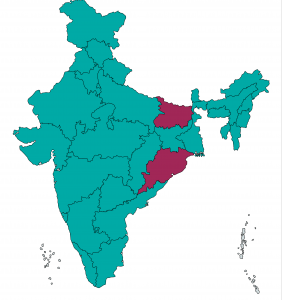
Odisha and Bihar
India is committed to reducing the burden of blindness by adopting the strategies advocated by Vision 2020 -“THE RIGHT TO SIGHT” which seeks to ensure the best possible vision for all people following an integrated approach. Currently, LEPRA is a member of VISION 2020 – a national forum in India committed to the prevention of blindness and an active partner in the National Programme for Control of Blindness (NPCB) for the prevention of blindness in Western Odisha.
The problem of eye involvement as a cause of disability in leprosy is well recognised. The estimates from existing surveys reveal that nearly one-quarter and one-half a million leprosy or ex-leprosy patients could be blind (vision less than 6/60). The visual disability in these patients is compounded with other disabilities, particularly sensory impairment and deformity.
Jagruti (awakening in Sanskrit) is a unique, integrated NTDs and WASH project collaboratively implemented by American Leprosy Missions, LEPRA Society and HI Rapid Lab of the Public Health Foundation of India. Piloted in Andhra Pradesh and Odisha in 2018-19, the program was scaled in Bihar in 2021. The 3-year project covers 130 villages of Kalyanpur block in Samastipur district, Bihar. The project aims to reduce risk of transmission of endemic NTDs among at-risk communities, and reduce the negative impact of chronic, disabling NTDs like leprosy and lymphatic filariasis among people affected, in this high-endemic, rural and remote Block. The project is women-led, utilizes digital technology to facilitate interventions, and employs a human rights-based approach to ensure sustainability. 130 trained women Community Resource Persons (CRPs), one from every village, lead the program interventions at the local level. They reach 63,630 households with education on recommended WASH practices and NTD prevention measures and promote behaviour change. The project works with 3815 SHGs, 38 SHG Federations, 40 schools, 31 local governing bodies, 186 village water and sanitation committee members, 782 frontline workers from government, PHC Medical Officers and government authorities as key stakeholders, engaging with local government and promoting people-led advocacy for essential water, sanitation, and health services. A baseline universal household survey completed by the CRPs in their own villages supports focused interventions and evidence-based advocacy. The project has line-listed around 5000 persons with leprosy and lymphatic filariasis for morbidity management and disability prevention to prevent new disability and worsening of existing disability, helping them avail government benefits, and advocating for primary level NTD care. The project is organizing them into 31 self-support groups at the panchayat level to facilitate advocacy and encourage regular self-care.

